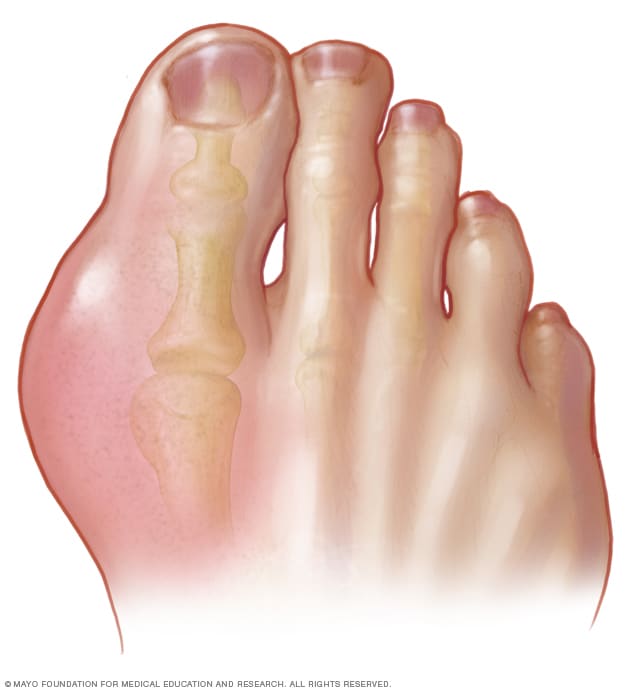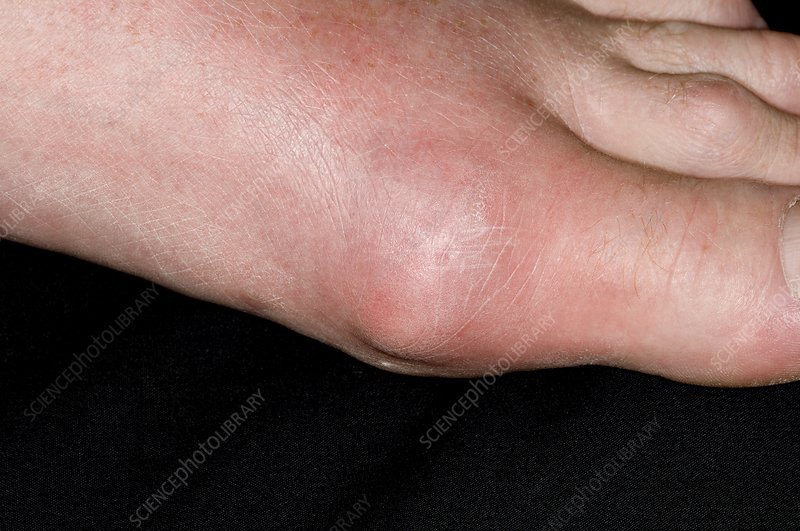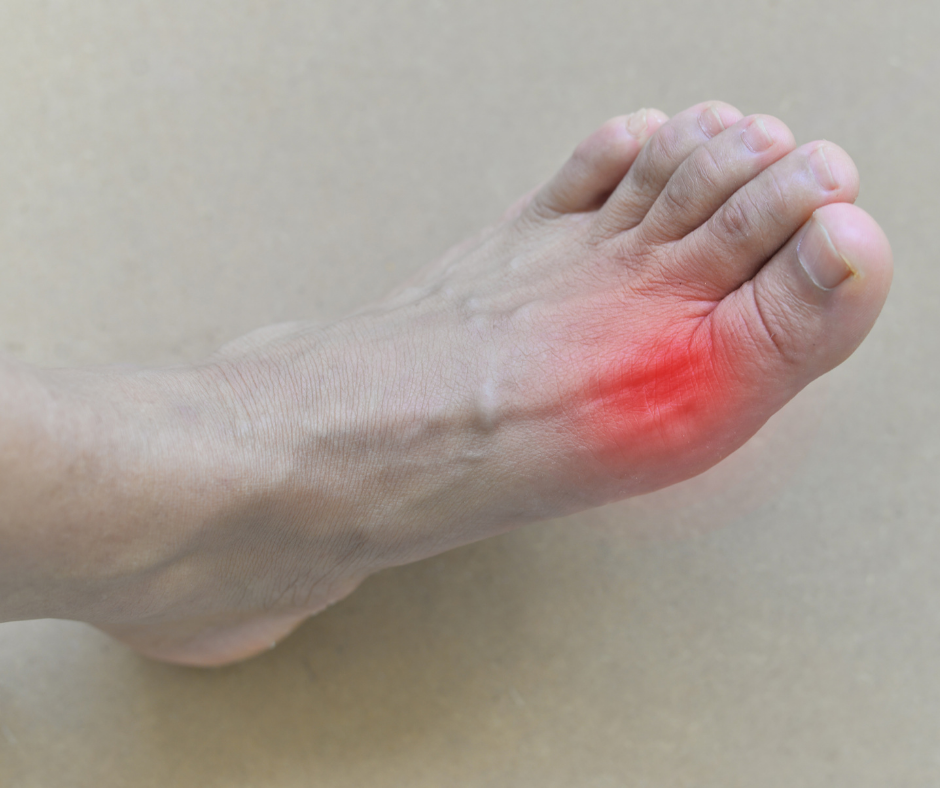Who Should Diagnose And Treat Gout
The disease should be diagnosed and treated by a doctor or a team of doctors who specialize in care of gout patients. This is important because the signs and symptoms of gout are not specific and can look like signs and symptoms of other inflammatory diseases. Doctors who specialize in gout and other forms of arthritis are called rheumatologists. To find a provider near you, visit the database of rheumatologistsexternal icon on the American College of Rheumatology website. Once a rheumatologist has diagnosed and effectively treated your gout, a primary care provider can usually track your condition and help you manage your gout.
What Are The Symptoms Of Gout In The Ankle
The main symptom of gout in the ankle is pain and discomfort in the surrounding area. Keep in mind that gout is often unpredictable, regardless of the joint its affecting. You might go weeks or even months without any symptoms, only to wake up with a burning pain in your ankle.
In some cases, gout starts out in one of your big toes before moving on to other areas, such as your ankle. Over time, these flare-ups may last longer than they previously did.
Other symptoms you might feel from gout in your ankle include:
- tenderness
Treating A Gout Attack
To reduce the inflammation and relieve the pain in your joint, your foot and ankle specialist will prescribe either an oral or injectable anti-inflammatory. He or she may also inject a steroid into the joint to manage the irritation.
If you have one gout attack, however, its an indication that your body has an excess of uric acid in the blood. Your foot and ankle specialist will work with you to figure out whats causing the excess and how to bring it down to healthy levels.
Medication can decrease your bodys production of uric acid during digestion and help your kidneys more effectively expel uric acid through urination. But you may also need to change your prescription drug intake or your diet and exercise routine.
Also Check: What Does Gout Feel Like In Your Big Toe
How Can A Gout Attack Be Prevented
Diet plays a key role diet in gout prevention: Since foods can directly set off gout attacks, patients with gout should receive counseling as to which foods are more likely to induce attacks. Losing weight is often also helpful. However, as important as diet is in gout, for most people with gout diet, and even weight loss, are not enough, and medications will be needed to get to their uric acid goal.
Reduce The Pressure Reduce The Pain

Gout cant be cured, but it can be managed effectively and ensuring that your feet receive expert care plays an important part in that process.
Our London podiatrists can help to relieve the pain caused by gout in your big toe with prescription orthotics. These custom-made shoe inserts are designed to make the affected area more comfortable by reducing the pressure its under. Whats more, we can offer expert advice on which shoes youll find most comfortable.
Podiatric padding and foot shields can be beneficial when gout strikes. In addition, if the swelling has led to sores, ulcers, calluses, etc., we can treat those issues too.
For expert help to relieve the foot pain caused by gout, please call Feet By Pody today on 0207 099 6657 or book a podiatry appointment online.
Recommended Reading: How Long Does Gout Pain In Toe Last
Can Your Toe Turn Black If You Have Gout
Ask U.S. doctors your own question and get educational, text answers â it’s anonymous and free!
Ask U.S. doctors your own question and get educational, text answers â it’s anonymous and free!
HealthTap doctors are based in the U.S., board certified, and available by text or video.
Lifestyle Changes To Help Foot Gout
Treating foot gout in the long-term requires a combination of lifestyle changes and medications. After you have taken the right medication to treat your gout flare and manage uric acid levels, you should be taking steps to correct your lifestyle. Theres only so much pills can do so its important to accompany it with habits that support your condition.
Start with your weight. You probably have gout because you are overweight or obese. You want to lose the excess fat since that contributes to the strain you feel on your feet. Exercising regularly and cutting back on food intake can significantly help with your goal of losing weight.
Only go for real whole foods and avoid items that trigger your gout such as processed foods. I recommend the 80-10-10 diet where 80 percent of your daily calories consists of complex carbohydrates, 10 percent as protein and the final 10 percent as fat.
Its important that you learn how your body reacts to each food item as every person has a different physiology. What may trigger an attack on you may do nothing for the other person. Start by eliminating common culprits such as sugar, alcohol, seafood, and organ meats.
You may need to keep a diary to track your food and medication. That way whenever you have a gout attack in your foot, you can trace back what you ate and learn what caused the trigger.
Recommended Reading: Best Over The Counter Treatment For Gout
Soothing Your Foot When Gout Strikes
If a gout attack makes your big toe hurt, there are several things you can do to make your foot more comfortable, in addition to taking your gout medication.
- Avoid wearing shoes, slippers and restrictive hosiery. You could even cut off the top of a sock to avoid putting your big toe under pressure.
- Wrap an ice pack in a towel and apply it to your big toe for short periods. Doing so should soothe the area and reduce the swelling.
- When you lie down, elevate your foot with the aid of cushions or pillows, so that its slightly higher than your chest, as this can also keep the swelling at bay.
- Leave your foot uncovered overnight.
Treatment Options For Gout
NSAIDs, such as celecoxib, indomethacin, meloxicam, or sulindac, may be prescribed by your doctor, or you may be advised to use over-the-counter NSAIDs, such as naproxen or ibuprofen.
Based on your medical history, your doctor may prescribe steroids or other anti-inflammatory medications, such as colchicine .
Your doctor may also advise you to make lifestyle changes, such as exercising regularly and decreasing weight. Additionally, you may be advised to adopt dietary changes, such as lowering your intake of red meat, shellfish, alcoholic beverages and fructose-sweetened beverages.
Related Topics :
Recommended Reading: Gout How Long Will It Last
Who Is At Risk For Gout
Anyone can be affected by gout.
Gout is most common in middle-aged men, especially those with a family history of the disease. Women can get gout, too, most often after menopause.
Your chances of developing gout are higher if you:
- Are overweight
- Drink too much alcohol, especially beer
- Eat a diet rich in meat and fish, which can be high in chemicals called purines
- Take certain medicines, like water pills , that can trigger an attack
Recent research also indicates that genetics may play a big role in determining who gets gout. Ask your doctor if you have questions about your risk for developing this condition.
Excess Uric Acid Leads To Gout Attacks
Gout is not only unpredictable and debilitating but also relatively common. According to the UK Gout Society, one in 14 men and one in 35 women will develop this joint disease. The problem occurs mainly in the lower extremities the knees, ankles and feet with big toe joints at the greatest risk. The NHS website includes a the skin looks extremely red and swollen.
People develop gout as a result of hyperuricemia, i.e. high levels of uric acid in the bloodstream. Uric acid crystals build up around the joint at the base of the big toe and other joints, ultimately tricking your body into thinking its under attack. White blood cells try to defend you by surrounding the crystals, leading to the severe joint pain and inflammation familiar to gout sufferers.
Gout pain can last for more than a week and often returns. To reduce the likelihood of permanent joint damage, urgent medical treatment is vital. Your doctor may prescribe medicine to lower uric acid levels, as well as anti-inflammatories.
You May Like: How Does Allopurinol Treat Gout
Medications For Acute Gout
Gouty Tophi Removal Surgery

Gouty tophi are nodules of crystallized uric acid normally found in the soft tissue, just under the skin.
When the tophi are small you may not even notice them, but as they grow they can become painful, restrict joint movement, and in rare cases, cause infections. While these nodules are often harmless and can be treated with medication, tophi removal surgery may be recommended in advanced cases.
Don’t Miss: Does Gout Cause Foot Swelling
Treatment Options For Bunions
The short answer to treating bunions is to wear the right shoes when possible. Jobs that require being active on your feet for hours at a time are not a good fit for wearing high heels. Likewise,wearing shoes that are wider and have a flexible sole to provide adequate cushioning is essential.
Warm soaks, ice packs and nonsteroidal anti-inflammatory medicines, like aspirin or ibuprofen, may assist when the bunion is inflamed and uncomfortable.
Surgery is also an option. By removing the bony protuberance and realigning the joint, the goal of surgery is to reduce discomfort and restore normal function . Although there are over 100 surgical methods for bunion repair, only a few have been examined or compared in controlled trials.
Treatment Of Foot Gout
If you suffer from foot gout, there are many different types of gout treatment approaches you can take to help lessen the flare.
Medication
Flares from foot gout can be treated using your regular gout medications. This includes NSAIDs, corticosteroids, and colchicine. These are short-term gout medications and should only be taken during a gout flare.
Then, certain medications need to be taken regularly to maintain low uric acid levels. This is called preventative medication and can include drugs such as allopurinol, febuxostat, probenecid, pegloticase, and lesinurad.
Light Exercise or Rest
This may sound counterintuitive but taking a walk during an attack might help you recover faster. For people who have had gout long enough, theyve lived through the pain and have gotten used to it.
However, if this doesnt work for you dont force it. Sit back, relax, and let your foot rest. Put it in an elevated position and place an ice pack on the affected area.
Buy a Comfortable Pair of Shoes
Find comfortable shoes that you can regularly wear preferably those that have cushioned insoles and a wide toe box. This helps support the feet and prevent contact with the toe which can feel sensitive to touch during the first few days after an attack.
Surgery
In certain situations, you may need to undergo an operation to remove the liquid inside. This is especially needed if the gout has already progressed into tophi.
Also Check: Kidney Disease And Gout Diet
What Increases Your Chances For Gout
The following make it more likely that you will develop hyperuricemia, which causes gout:
- Being male
How Is Gout Diagnosed
Your health care provider will get your complete medical history and do a physical exam. She may run these exams and tests to diagnose gout:
- Ajoint fluid analysis to see if uric acid crystals are present. This is the only certain way to diagnose gout.
- Tests to measure uric acid levels in blood and urine
There are many conditions with symptoms similar to gout. Be sure to see your doctor for a diagnosis.
You May Like: Are Pickles Bad For Gout
How Are Gout Attacks Prevented
Maintaining adequate fluid intake helps prevent acute gout attacks and decreases the risk of kidney stone formation in people with gout. Alcohol is known to have diuretic effects that can contribute to dehydration and precipitate acute gout attacks. Alcohol can also affect uric acid metabolism and cause hyperuricemia. It causes gout by slowing down the excretion of uric acid from the kidneys as well as by causing dehydration, which precipitates the crystals in the joints.
Why Does Gout Affect The Big Toe
According to the American College of Foot and Ankle Surgeons, gout is most common in the big toe joint because uric acid is sensitive to temperature changes. The foot is farthest from the heart and is the coolest part of the body, so that big toe joint can be a canary in the coal mine when it comes to gout.
Read Also: What Does Gout Feel Like In Your Feet
What Causes Foot Gout
We already know what causes gout. But youre probably wondering why the foot is the most impacted part of the body.
First is the fact that the feet have the lowest temperature in the body. It is furthest from the heart resulting in poor circulation in that area. Uric acid dilutes poorly in low-temperature levels making it easy to reproduce and create new crystals that build up.
Second, the feet are also an easy target for physical trauma. Your feet are the most used part of the body and therefore are at more risk of injury.
What Is Gout Its Causes

Gout is actually a type is arthritis that happens due to hyperuricemia, a condition where blood uric acid level increases more the normal level. So, what happens when uric acid increases in our body?
Uric acid present in the blood gets ionized into Monosodium Urate Crystal. Normally these urate crystal gets dissolved and its solubility is affected by:
- Synovial fluid pH,
- Electrolytes level, and
- Other synovial components such as proteoglycans and collagen.
But, when the level of uric acid increases the urate crystal starts deposition gets starts in the tissue around the joints leading to gout. There are two factors that causes the increase in the uric acid level one is overproduction of uric acid and second condition is when there is decreased excretion of uric acid from the body.
Recommended Reading: Does Red Meat Affect Gout
Osteoarthritis And Hallux Rigidus
The most common form of arthritis in the big toe is osteoarthritis, otherwise known as wear and tear arthritis. Osteoarthritis that occurs in the joint at the base of the big toe is often referred to by the medical name hallux rigidus. This condition often results in progressive stiffness in the toe and pain when walking, or even standing.
Over a long period of time, the soft, rubbery cartilage that provides shock absorption and reduces friction within your joint can grind down and deteriorate. The body has very limited ability to repair or replace cartilage, so once its gone, its gone. This can eventually lead to bone on bone grinding and painful stiffness in the affected joint.
Although this process can happen naturally over time, big toes are also vulnerable to post-traumatic arthritis, which is a subset of osteoarthritis affecting joints that have been previously injured. If you have a history of other toe injuries, the cartilage may wear down faster, leading to arthritic pain much earlier than elsewhere. The onset may be several years after the initial injury, but several years before other joints become arthritic.
Effective Medical Treatment For Gout
The American College of Rheumatology released gout management guidelines in 2012 and updated them in 2020. They recommend drugs classified as urate-lowering therapy for those who have experienced two or more gout attacks in a year as well as for those with joint damage from gout.
Specifically, the organization recommends allopurinol as a first-line treatment for all gout patients, even those with chronic kidney disease. Next in line is febuxostat both are a class of drugs called xanthine oxidase inhibitors.
In addition, the guidelines recommend use of anti-inflammatory medications including NSAIDs, prednisone, or colchicine along with the other medication.
Read Also: Does Having Gout Make You Tired
Risk Factors For Gout
Obesity, excessive weight gain, especially in youth, moderate to heavy alcohol intake, high blood pressure, diabetes, and abnormal kidney function are among the risk factors for developing gout. Certain drugs and diseases can also cause elevated levels of uric acid. Also, there is an increased prevalence of abnormally low thyroid hormone levels in patients with gout.